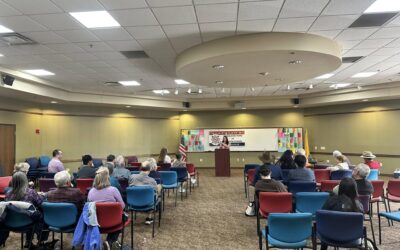This article is written by our Guest Blogger, George Columbo.
If you’re a voter of a certain age, you probably remember a phenomenon called ticket-splitting. That’s the term we once used to describe the practice of someone voting for a candidate from one party at the top of the ticket but one or more candidates from a different party in other races appearing further down on the ballot.
For example, in Richard Nixon’s 1972 landslide re-election, 190 districts that voted for Nixon also elected Democratic candidates for the House of Representatives. That’s almost 45 percent of every congressional district in the country. Fast forward to our current political environment, however, and you find that ticket-splitting has just about disappeared from the political landscape.
By 2012, just six percent of congressional districts produced a split ticket result. Historians can argue about how and why this happened but I’d like to focus instead on the more pressing question of whether or not it’s a good thing for us as voters or for the country. (Spoiler alert: It’s not.)
I’m not here to convince you that your partisan convictions are wrong. You’re reading this post — and I’m writing it — because we both care about policy and politics. I certainly won’t vote for a candidate who is going to implement policies I oppose. I’m going to vote for candidates who are likely to enact policies I support… and I fully expect you to do the same thing. That’s precisely why we vote and to behave otherwise wouldn’t be reasonable or rational. But it’s also rational to recognize that this principle doesn’t apply to every race on every ballot…especially here in New Mexico.
Here’s what I mean: Executive offices and legislative offices are offices where electoral success translates directly into governmental policy. The executive and legislative branches collaborate on crafting laws and implementing policy. As a result, elections for those offices are certainly ones in which a partisan impulse is understandable and arguably appropriate. If you can’t imagine voting for a member of the opposing party for those offices, I get that and won’t offer any pushback.
In every election, though — and especially here in New Mexico — there are plenty of ostensibly partisan races that often impact our day–to–day lives more than who’s sitting in the Governor’s chair or who we’re sending to Washington to write our laws. In some other states, these races are designated as nonpartisan (as is the case with New Mexico’s municipal elections). These are offices that deserve a different standard than executive or legislative races. I’d argue that elections for these races ought to be judged based on a candidate’s competence rather than their credo.
Our County Commissioner races would arguably fall into this category. The same is true for races like Magistrate Judge, Probate Judge, District Judge, or Sheriff. We don’t elect candidates to these offices to create policy; we elect them instead to implement the policies that are created by the Executive Branch and the legislature.
You might remember this recent example of what I’m describing: Rodney Jones, the Democratic Candidate for Valencia County Sheriff, was asked in a candidate forum about his position on assault weapons. Rather than answer the question in a way that would score political points, Jones said his position on assault weapons isn’t relevant. His job as Sheriff, he explained, is to enforce whatever policy is established by New Mexico’s legislature. While that’s probably not a satisfying answer for partisans (from either party), it was an answer that correctly reflects the purview of the office he’s pursuing.
For an office like Sheriff (or any of the other offices mentioned earlier), a candidate’s competence is far more important — and far more relevant — than their political affiliation. It’s a sensible approach that all of us should consider when we enter the voting booth.
Sure, we all have partisan convictions and it makes all the sense in the world to follow those convictions when we’re voting for a candidate whose election will set the policies of our government. But not every election needs to be seen through the prism of ideological battle. Let’s understand that, in some elections, our best interests as voters depend on electing the most competent, experienced candidate on the ballot.

George Colombo is a retired writer and entrepreneur. He worked on Democratic campaigns in Florida and Virginia before moving here to New Mexico earlier this year with his wife and their two pets, a dog and a cat. The cat is apolitical but the dog is all in for Gabe Vasquez.
Disclaimer: The views and opinions expressed by Guest Bloggers are those of the authors and do not necessarily reflect the views or positions of the Democratic Party of Valencia County.



